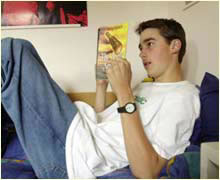Stage 3 Tasks
(Choose 1 of 4)
Detailed review
Write a review (300-600 words) on a book you have read.
It should be written in a lively, upbeat style aimed at an audience of people your age.
You should refer to genre, plot, characters, key incidents, main themes, the author and any other features you think are important.
If it is a book you would not wish to recommend to others, feel free to criticise it.
See examples here.
Discursive/argumentative essay (non-fiction only)
Research an issue that people tend to disagree about. Make notes and record your sources of information.
EITHER
Write an essay in which you give both sides of an argument, supported with evidence. Decide which argument is the most persuasive, saying why you think this is so. (Discursive)
OR
Take one side of an issue and argue strongly for or against it. (Argumentative)
Length: 300-600 words. Include a bibliography.
Imaginative response (fiction only)
Write an imaginative response (300-600 words) using a novel you have read recently.
Use one of the following suggestions, or adapt one to fit your novel:
• Take a key incident and rewrite it from the point of view of someone other than the main character.
• Expand and develop an event or incident which is just touched upon in the story.
• Write a letter from a character in the novel to someone who is not, giving his or her thoughts and feelings about what happens in the book. See an example here.
Critical study
EITHER
Write a critical evaluation (300-600 words) of a novel, short story or poem (s) you have enjoyed reading. See an example here.
Use or adapt one or more of the following topics:
• Why was it a good story?
• Describe the central conflict, what led to it and how it was resolved.
• Give a detailed study of one of the central characters.
• Compare and contrast two characters.
• Did the short story / novel have a strong central idea? How did the author explore this idea through the characters and plot?
OR
Write a critical evaluation (300-600 words) of a non-fiction book you have found interesting.
Explore some or all of the following questions:
• What first attracted you to the book?
• Why has it been written, who has it been written for and how do you know?
• What clues can be found from the style of the opening chapter about the writer’s attitude is towards his / her topic?
• What do the pictures and graphics add to your understanding of the subject of the book?
• Has the writer succeeded in putting across the topic?
Write a review (300-600 words) on a book you have read.
It should be written in a lively, upbeat style aimed at an audience of people your age.
You should refer to genre, plot, characters, key incidents, main themes, the author and any other features you think are important.
If it is a book you would not wish to recommend to others, feel free to criticise it.
See examples here.
Discursive/argumentative essay (non-fiction only)
Research an issue that people tend to disagree about. Make notes and record your sources of information.
EITHER
Write an essay in which you give both sides of an argument, supported with evidence. Decide which argument is the most persuasive, saying why you think this is so. (Discursive)
OR
Take one side of an issue and argue strongly for or against it. (Argumentative)
Length: 300-600 words. Include a bibliography.
Imaginative response (fiction only)
Write an imaginative response (300-600 words) using a novel you have read recently.
Use one of the following suggestions, or adapt one to fit your novel:
• Take a key incident and rewrite it from the point of view of someone other than the main character.
• Expand and develop an event or incident which is just touched upon in the story.
• Write a letter from a character in the novel to someone who is not, giving his or her thoughts and feelings about what happens in the book. See an example here.
Critical study
EITHER
Write a critical evaluation (300-600 words) of a novel, short story or poem (s) you have enjoyed reading. See an example here.
Use or adapt one or more of the following topics:
• Why was it a good story?
• Describe the central conflict, what led to it and how it was resolved.
• Give a detailed study of one of the central characters.
• Compare and contrast two characters.
• Did the short story / novel have a strong central idea? How did the author explore this idea through the characters and plot?
OR
Write a critical evaluation (300-600 words) of a non-fiction book you have found interesting.
Explore some or all of the following questions:
• What first attracted you to the book?
• Why has it been written, who has it been written for and how do you know?
• What clues can be found from the style of the opening chapter about the writer’s attitude is towards his / her topic?
• What do the pictures and graphics add to your understanding of the subject of the book?
• Has the writer succeeded in putting across the topic?



